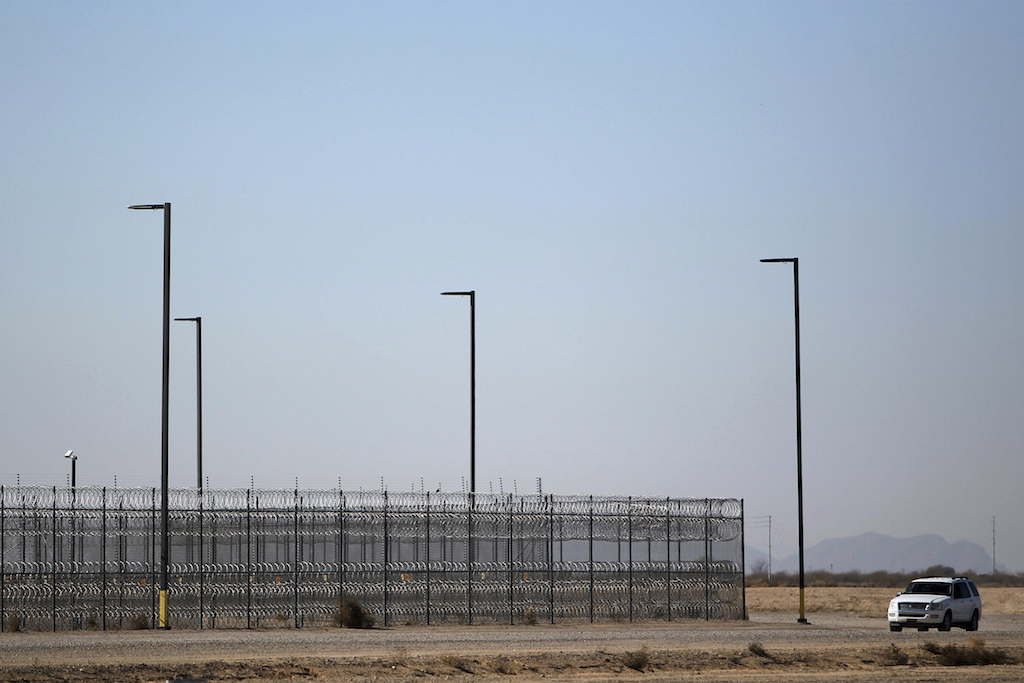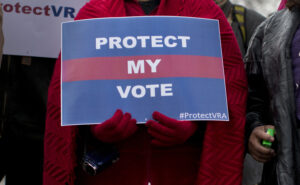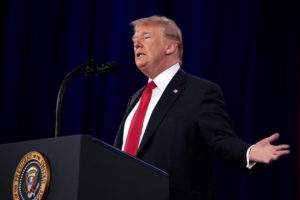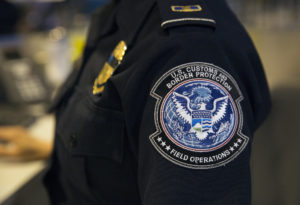Private Prisons Are Thriving Under Trump
The industry’s success is another side effect of the administration’s tough-on-crime stance—no matter the consequences. An unmarked police truck patrols the outside of a private detention center operated by CoreCivic in Eloy, Ariz. (Ricardo Arduengo / AP)
An unmarked police truck patrols the outside of a private detention center operated by CoreCivic in Eloy, Ariz. (Ricardo Arduengo / AP)
So much for not profiting from suffering. After Attorney General Jeff Sessions rescinded an Obama-era order in February to phase out the use of private prisons, the industry has recovered, CNN reports.
In 2016, President Obama’s deputy attorney general, Sally Yates, issued a memo calling on the Department of Justice to curtail its use of prisons run by for-profit companies. But now the private prison industry looks as it did before that.
According to CNN:
A large share of people locked up in federal private facilities are criminal undocumented immigrants, and populations at the local level vary wildly depending on the state. Many states have no private institutions while others contract with these companies for a sizable share of their prisoners.
So when it comes to the Trump administration, these prison contractors are eyeing both criminal law enforcement and immigration. But on both counts, the people going to private prisons paid for by the federal government are largely immigrants.
From Day One of Trump’s campaign, he pushed heavily for a crackdown on undocumented immigration, and once in office, Trump ordered Immigration and Customs Enforcement to ramp up its enforcement efforts.
For years, ICE has outsourced the bulk of its detention operations to the private sector.
CoreCivic and GEO Group, two major private prison companies in the United States, both made large donations to the Trump campaign. Politico reports that the GEO Group hired two former Sessions aides as lobbyists in the month before the election. “The Bureau of Prisons renewed two large contracts for GEO Group in May, and CoreCivic said in its second quarter earnings call it expected the Trump administration would mean more contracts for the company,” CNN explains. On Nov. 9, the day after the election, CoreCivic saw a 43 percent jump in its stock price, while GEO stock rose 21 percent. On Feb. 24, stocks in both companies had risen more than 100 percent since Election Day.
The ACLU and other civil rights groups long have denounced the use of private prisons, and they were not happy when Sessions revoked the 2016 order.
The New York Times wrote in an editorial at the time:
This policy reversal is indefensible given the track record of private prisons. Like a parasite, the industry fed off harsh and shortsighted sentencing policies, such as mandatory minimums and three-strikes laws, that resulted in the largest prison population in the world. By 2014, the top two companies had revenues of $3.3 billion, nearly double what they made in 2006. They promised to provide incarceration at a lower price, but it didn’t work out that way.
Horror stories abound of corruption and abuse at private prisons and detention facilities, where violence is common, and where underpaid and undermonitored guards act with impunity. Privately operated prisons compare poorly with government facilities on most key measures, as Sally Yates, Mr. Obama’s deputy attorney general, explained in a memo accompanying last summer’s order. They aren’t as safe or secure for staff members or inmates. They don’t provide the same level of rehabilitative services, like educational programs and job training, that help people lead law-abiding lives after prison. They don’t even save substantially on costs.
Of course, the whole idea of privatized incarceration is morally repugnant. Imprisoning people should never be entrusted to those whose primary concern is profit and shareholder return.
Udi Ofer, political director of the American Civil Liberties Union, agreed, telling CNN, “Profit should not play a role in the criminal justice system.” Sessions replied that the curtailment of private prisons “impaired the bureau’s ability to meet the future needs of the federal correctional system.” This preceded his announcement that he is relaunching the so-called war on drugs, a historically racist effort that has provided overwhelming evidence that minimum sentences for nonviolent federal drug offenses do little except exacerbate mass incarceration.
The success of private prisons is yet another side effect of the Trump administration’s obsession with appearing tough on crime, no matter the consequences.
Your support matters…Independent journalism is under threat and overshadowed by heavily funded mainstream media.
You can help level the playing field. Become a member.
Your tax-deductible contribution keeps us digging beneath the headlines to give you thought-provoking, investigative reporting and analysis that unearths what's really happening- without compromise.
Give today to support our courageous, independent journalists.






You need to be a supporter to comment.
There are currently no responses to this article.
Be the first to respond.